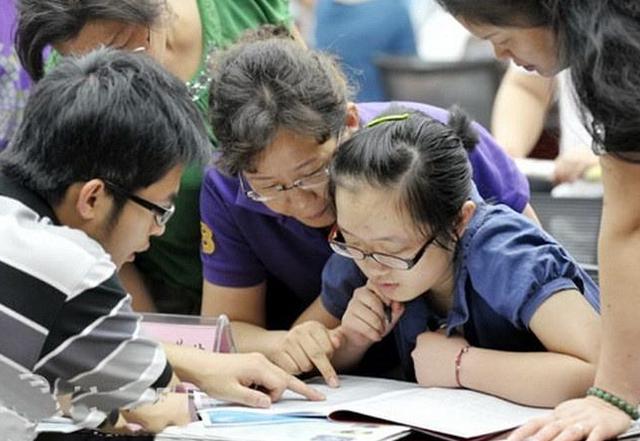备战高考,希望大家开始提前积累素材及方法,这份资料值得打印收藏!
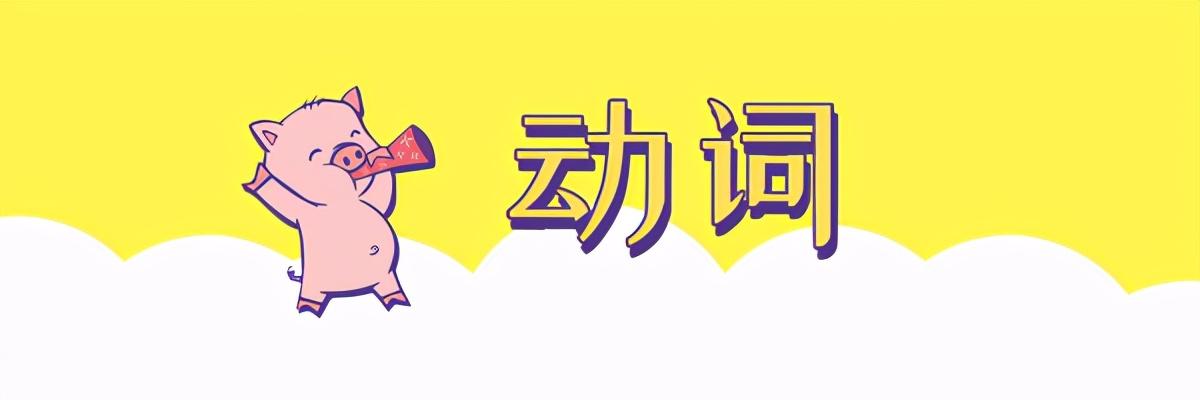
动词的基本形式
绝大多数动词都有五种基本形式:动词原形、一般现在时第三人称单数、过去式、过去分词和现在分词。
一般现在时主语是第三人称单数时,谓语动词后要加s或es,其变化规则与名词变复数的方法大体相同:
1
规则动词变化表
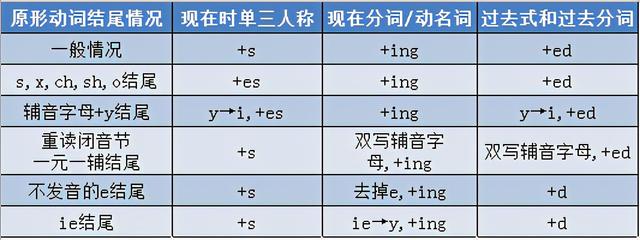
2
不规则动词变化表
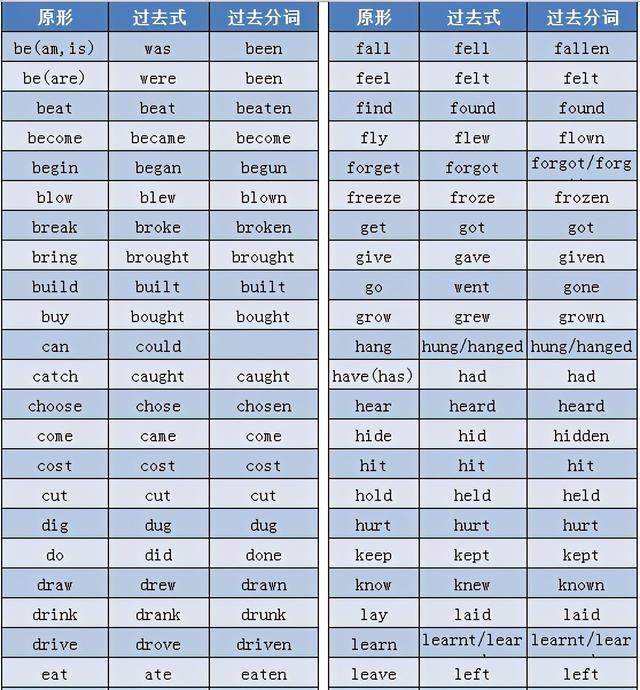
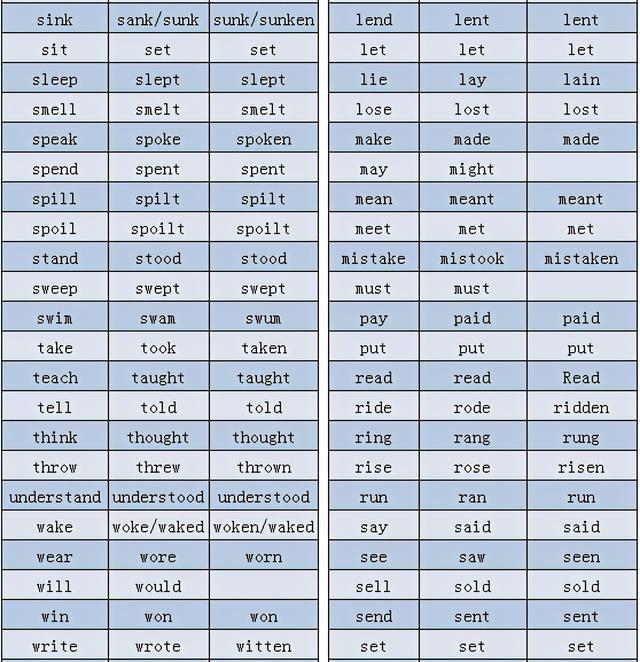

★ 系动词
1
概念及特点
连系动词,即系动词,是一个表示谓语关系的动词。它必须后接表语通常为名词或形容词。
连系动词的功能主要是把表语(名词、形容词、某些副词、非谓词、介词短语、从句)和它的主语联系在一起,说明主语的属性、特征或状态。它有自己的但不完全的词义,不能在句中独立作谓语,必须和后面的表语一起构成句子的谓语。它是虚词。
2
系动词分类
⒈ 状态系动词:用来表示主语状态,只有be 一词。
如:He is a teacher.他是一名教师。(is与补足语一起说明主语的身份。)
⒉ 持续系动词:用来表示主语继续或保持一种状况或态度,主要有keep,rest,remain,stay,lie,stand。
如:He always kept silent at meeting.他开会时总保持沉默。
This matter rests a mystery.此事仍是一个谜。
⒊ 表像系动词:用来表示“看起来像“这一概念,主要有seem,appear,look。
如:He looks tired.他看起来很累。
He seems (to be) very sad.他看起来很伤心。
⒋ 感官系动词:主要有feel,smell,sound,taste。
如:This kind of cloth feels very soft.这种布手感很软。
This flower smells very sweet.这朵花闻起来很香。
⒌ 变化系动词:这些系动词表示主语变成什么样,变化系动词主要有become,grow,turn fal( asleep),get,go,come,run。
如:He became mad after that.自那之后,他疯了。
She grew rich within a short time.她没多长时间就富了。
⒍ 终止系动词:表示主语已终止动作,主要有prove,turn out,表达“证实”“变成“之意。
如:The rumor proved false.这谣言证实有假。
The search proved difficult.搜查证实很难。
His plan turned out a success.他的计划终于成功了。(turn out表终止性结果)
⒎ 使役动词:let,have,make使,让……
① Let/make somebody do sth
如:The teacher lets/makes them clean the classroom after school.
② Make sb/sth adj.
如:The story makes me happy.
The color makes it look beautiful.
③ Have somebody do sth让某人做某事
如:My mother haves me make the bed.
④ Have sth done让某物被……
如:I have my hair cut/washed.
3
特例
有些动词它们既可以用作实义动词,又可以用作连系动词。另外be还可用作助动词。它们的用法不同,词义和句型结构也有所不同。
如:Look at the blackboard,please.请看黑板。(look用作实义动词)
He looks a little tired.他略显疲倦。(look用作连系动词)
They are at work.他们在工作。(are用作连系动词)
They are working.他们正在工作。(are用作助动词,帮助构成现在进行时)
★ 及物动词和不及物动词
英语中按动词后可否直接跟宾语,可把动词分成不及物动词与和及物动词。
1
不及物动词
不及物动词后不能直接跟有动作的对象(即宾语)。若要跟宾语,必须先在其后添加上某个介词,如to,of ,at后方可跟上宾语。具体每个动词后究竟加什么介词就得联系动词短语。
如:listen to,look at….
⒈ look 看 (vi.) …… 宾语(即不能直接加宾语).
如:Look! She is singing.
Look carefully! (注意:carefully 是副词,不是名词,故不作宾语)
look at (看…….) 宾语
如:Look at me carefully! (me是代词,作宾语)
⒉ 分清及物不及物动词
分清动词的及物不及物是在英语学习中必须解决的首要问题。动词及物与不及物通常有以下几种情况:
① 主要用作及物动词。及物动词后面必须跟宾语。可以用于:"主+谓+宾";"主+谓+双宾";"主+谓+宾+宾补"结构。
如:He reached Paris the day before yesterday.
Please hand me the book over there.
They asked me to go fishing with them.
类似的还有:buy, catch, invent, found, like, observe, offer, prevent, promise, raise, find, forget, receive, regard, see, say, seat, supply, select, suppose, show, make, take, tell…
② 主要用作不及物的动词。不及物动词后面不跟宾语。只能用与:"主+谓"结构。
如:This is the room where I once lived.
类似的还有:agree, go, work, listen, look, come, die, belong, fall, exist, rise, arrive, sit, sail, hurry, fail, succeed....
③ 既可以用作及物又可以用作不及物的动词,其意义不变。如begin 都是作"开始"讲。
如:everybody , our game begins.
let us begin our game.
类似的还有:start, answer, sing, close, consider, insist, read, learn, prepare, pay, hurt, improve....
④ 既可以用作及物又可以用作不及物的动词,其意义完全不同。这类动词作不及物动词是一个意义;而作及物动词时却是另一个意义。
如:lift作不及物动词时是指烟雾的"消散"。
例句:we saw the mountain when the clouds lifted.
作及物动词时是"升高;举起"。
例句:He lifted his glass and drank.
类似的还有:
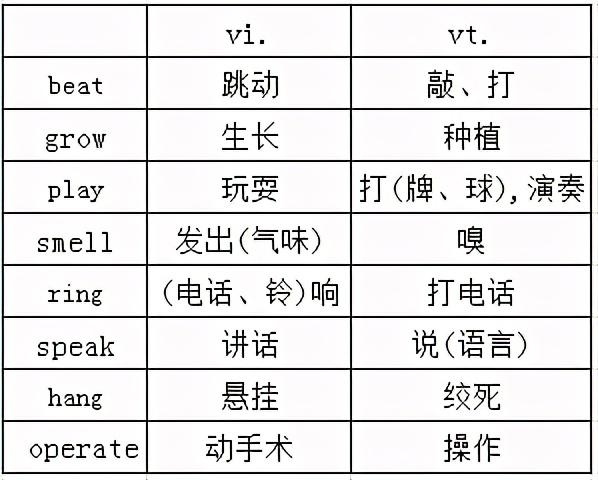
需要注意的一点是:少数不及物动词唯一可跟的宾语是同源宾语。
如:I dreamed a dream last night.
★ 助动词
1
概念
助动词是帮助主要动词构成各种时态,语态,语气以及否定或疑问结构的动词,助动词分为时态助动词和结构助动词两种。
2
特点
⒈ 助动词自身没有词义,不可单独使用。
如:He doesn't like English他不喜欢英语。(doesn't是助动,无词义;like是主要动词,有词义。)
⒉ 助动词协助主要动词完成以下功用,可以用来:
① 表示时态
如:He is singing.他在唱歌。
He has got married.他已结婚。
② 表示语态
如:He was sent to England.他被派往英国。
③ 构成疑问句
如:Do you like college life?你喜欢大学生活吗?
④ 与否定副词not合用,构成否定句
如:I don't like him.我不喜欢他。
⑤ 加强语气
如:He did know that.他的确知道那件事。
⑥ 最常用的助动词有:be,have,do,shall,will,should,would
⑴ 半助动词
在功能上介乎主动词和助动词之间的一类结构,称为半助动词。常见的半助动词有be about to,be due to,be going to,be likely to,be meant to,be obliged to,be supposed to,be willing to,have to,seem to,be unable to,be wiling to等
⑵ 情态助动词
a. 情态助动词包括will(would),shalshould),can(could),may(might,must,need,dare,ought to,used to,had better 后接原形不定式。
b. 情态助动词不受主语的人称和数的限制。
c.两个情态助动词不能连用。
中文:他将能够及时完成此事。(误)He will can finish it in time.
⑶ 基本助动词
基本助动基本助动词只有三个:be、do、have,他们没有汇意义,只有语法作用,和实意动词一起构成谓(叫复合谓语),表达否定、疑问、时态、语态和其他语法关系。其基本形式和作用如下表:

3
助动词的分类
⒈按结构分:时态助动词和结构助动词
⒉ 时态助动词有:be(am,is,are;was,were),have(has,had),will(would)和shall(should)和主动词一起构成各种时态、语态和语气。
⒊ 结构助动词:do(does,did),本身无词义,它仅为无助动的动词提供助动词,构成疑问结构和否定结构。
4
助动词具体用法
时态助动词同主动词一起构成十六种时态和十种被动语态结构。注意:被动语态没有完成进行时和将来进行时态。
⒈ 助动词be的用法
助动词be 有八种形式:
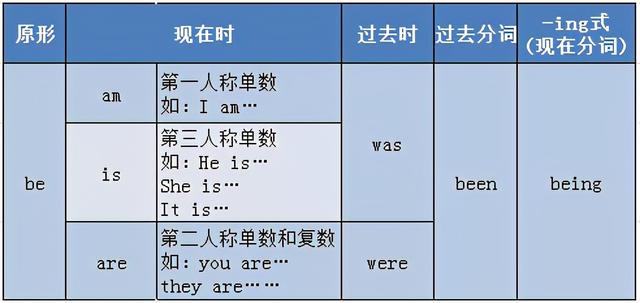
注意:它们的肯定、否定、缩略形式。第一人称的反意疑问句的句尾中用aren't;be的现在词和过去分词的否定形式是在前加not being和not been它们没有缩略形式。
① be 现在分词,跟现在分词构成各种进行时态
如:We are playing video games on TV last night.我们在电视上玩电子游戏。
② be 过去分词,跟过去分词构成被动语态
如:He's not respected by the press.他们不受报界的尊重。
注意:be 过去分词”不一定都是被动语态,有时可能是系表结构,两者主要区别是:被动语态表示以主语为承受者的动作;而系表结构则表示主语的特点或所处的状态。
③ be(am,is,are)动词不定式,可表示下列内容
⑴ 用现在时表示最近、未来的计划或安排。说明:这种用法也可以说成是一种将来时态表达法。
如:He is to go to New York next week.他下周要去纽约。
⑵ 表示命令
如:You are to explain this.对此你要做出解释。
⑶ 征求意见
如:Who is to go there?谁该去那儿呢?
⑷ 表示相约、商定
如:We are to meet at the school gate at seven tomorrow morning.们明天早晨7点在校门口集合。
⒉ 助动词have的用法:
助动词have的五种形式:
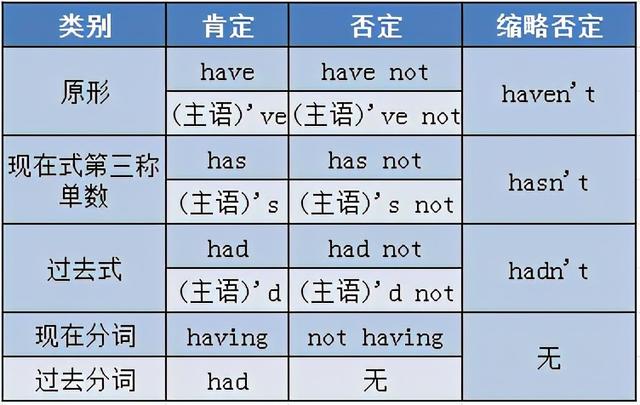
⒊ 助动词do的用法:
结构助动词do三种形式

① 帮助构成实意动词一般现在时和一般过去时的疑问式和否定式:
如:Do you know John?你认识约翰吗?
Mary didn't come to see me yesterday.玛丽昨天没来看我。
You like this picture,don't you"?你喜欢这张画,不是吗?
② 代替前面已经提到过的动词,避免重复:
如:—Do you smoke?你抽烟吗?
—Yes,I do是的,我抽。
I moke. So does he.我抽烟。他也抽。
He doesn't like it.Neither do I.他不喜欢,我也不。
③ 帮助加强谓语动词的语气,该do、does或did要重读;did加强过去时谓语动词语气时,这个谓语动词要用原形。
如:l do like you.我真的喜欢你。
She/He does like you.他确实喜欢你。
She/They/We did go swimming yesterday.她/他们/我们昨天确实去游泳了。
⑴ 另外:如果谓语中有助动词或情态动词,要加强语气时就能用do的各种形式来强调,一般方法是把需要强调的词全用大写字母来书写。
⑵ 一般祈使句前面加助动词do构成肯定的强语势祈使句,末尾加感叹号。
⑶ 第二人称祈使句强调语气有两种其它形式:
a. 用never 代替don't.
b. 主语you不省略或不加呼语。
如:Find yourself someone else to shout at.你跟别人喊去!
c. 当谓语动词前有否定意义的副词(never,seldom,hardly,rarely,scarce等)时,起强调作用的助动词(do,does,did)要加在该动词前面而不是加在副词的前面。
如:He seldom does come late.他的确极少迟到。
d. 注意:be,have,do都能做实意动词用:
如:These are computers.这些是计算机。
We're having breakfast.饿们正在吃早饭。
I did some washing last night.我昨晚洗了衣服。
④ 构成否定祈使句,说明:构成否定祈使句只用do,不用did和does。
如:Don't go there.不要去那里。
Don't be so absent-minded.不要这么心不在焉。
⑤ 用于倒装句。
如:Never did I hear of such a thing.我从未听说过这样的事情。
说明:引导此类倒装句的副词有never,seldom,rarely,little,only,so,well等。
⒋ 助动词 shall 和will的用法:
① 助动词shall/will构成一般将来时;should/would构成过去将来时。
如:We shall/will be rich,if we succeed.我们将很富有,如果我们成功的话。
They will be rich,if they succeed.他们将很富有,如果他们成功的话。
They said they would be rich,if they succeeded.他们说他们将很富有,如果他们成功的话。
② shall用在第一、三人称作主语的疑问句中,来征求意见,表示“要不要……”。
如:Shall I go now?要我现在就走吗?
Shall the reporters wait outside or what?要记者们在外面等还是怎样?
③ shall用于所有人称,表示说话人的决心、保证、许诺、威胁、警告、命令等强烈的感情。
如:You shall have an answer by tomorrow.到了明天,你会得到答复的。
The enemy shall not pass.决不允许敌人过去。
The ceremony shall not be postponed/put off.仪式不会推迟的。
④ would可以表示过去的习惯,类似used to
如:He would come to see me on Sunday when he was here.他这里的时候,星期天就来看我。
⑤ wil可以表示“愿意、肯、会、固执”等意义,而非将来
如:l will pay you for it.我会付给你钱买下它的。
⑥ will可以表示倾向、习惯(总是会,老是等意思),在否定句中可以表示不肯、不能”等意思:
如:Boys will be boys.男孩子总归是男孩子。
0il and water will not mix.油和水是不会混合在一起的。
This machine won't work.这台机器不工作了坏了。
These things will happen.这样的事情总是会发生的。
5
再论助动词
⒈ be have和do(主要的助动词)
① 在否定句和疑问句中,be与do的用法遵从助动词的下列规则:
⑴ 否定句中,助动词 not
如:He isn't coming.他不来了。
lt did not matter.没关系。
⑵ 疑问句中,主语 助动词
如:Was he waiting?他当时在等吗?
Does she see us?她看到我们了吗?
② have在疑问句及否定句中的位置一般与助动词相同
如:Has he(got )to go?他一定得走吗?
但有时也用do/did形式
如:Does he have to go?他一定得走吗?
③ be与带to的动词不定式连用
如:They are to wait for us at the station.将在车站等我们。
have 后也可接带to的动词不定式,但有两种结构除外。do 与不带to的不定式(即动词原形)连用:
如:Did he write?他写信了吗?
④ be have和do作助动词使用时,需要带分词或不定式,但在答句或评语等中常省略。
如:—have you seen t-你看见了吗?
—Yes,I have(seen it)一是的,(我看见了)。
⑤在be,have和do作普通动词使用而有自己本身的意思,如have有“拥有”的意思、do有“干/从事”的意思等时,它们只能是句子中唯一的动词:
如:He is lazy.他很懒惰。
He has no job.他没有工作。
He does nothing.他什么事也不干。
在这种情况下,do与助动词do/did 连用:
如:What do you do in the evening?你一般晚上做什么?
have可以用两种方法进行变化,即用助动词do/did 或不用:
如:Have you(got)time?/Do you have time?你有空吗?
⒉ can,could,may,might,must,ought,will,would,shall和should 是情态动词,也称情态助动词。
① 情态动词的第三人称单数后不加s
如:lmust我必须
he must他必须
I can我可以
he can他可以
② 它们在构成否定形式和疑问形式时均遵循助动词的规则
eg.will not…
ought not……
will he……?
bught he..?
③ 它们没有真正的过去时态。情态动词有四种过去形式,即could,might,should和would,但用途有限。
④ 情态动词没有不定式或分词形式,所以不能用于进行时态。
⑤ 除ought之外其他情态动词后一律跟不带to的动词不定式(即动词原形)
如:You should pay./You ought to pay.你应该付钱。
情态动词后面应带动词原形(而非分词等),但有时该动词可省略;
如:—Can you understand? -你明白吗?
—Yes,I can(understand)-是的(,我明白)。
⒊ need,dare和used(半情态动词)
① 当need和dare作助动词时,可遵循情态动词的句式,后面跟不带to的动词不定式
如:He need not wait.他不用等。
但也可与do/did 形式连用,这时后面要接带to的动词不定式:
如:He doesn't dare to interrupt.他不敢插嘴。
They didn't need to wait.他们不需要等。
注意:need和dare也可作普通动词用,有词形变化,并可与分词连用:
如:He needs help.他需要帮助。
They dared me to jurmp.他们激将我,要我跳下去。
② used有时说成used to,只指过去的事。它的否定式和疑问式常常遵循助动词的规则
如:l used not/usedn't to go.我一向不去。
虽然严格来讲used不带不定式,但经常可以听到didn't use to和did he/she等 use to?的形式。
6
分析助动词和情态动词的异同
⒈ 相同点:
① 都可构成疑问句,并且都能用在肯定或否定的简略式回答中。
如:Was the car going beyond the speed limit?车是否在超速行驶?
Yes.it was.是的,在超速行驶。
② 都可与not连用构成否定句。
如:At first,it didn't sell very well.初,它的销路不好。
③ 都能构成反意疑问句。
如:You didn't let me drive,did you?你没有让我开车,对吗?
④ 都可以在so…或neither(nor)…句型中,代替前面的动词(短语)。
如:You can't do it,nor can I,nor can anybody else。不能那样做,我也不能,任何人都不能。
⒉ 不同点
谓语中只能有一个情态动词,但可有多个助动词。
如:He was being trained to be a doctor.他时正接受培训,要成为一名医生。
情态动词
情态动词是表示能力、义务、必须、猜测等说话人的语气或情态的动词。
1
can
⒈ 表能力:can表能力时意味着凭体力或脑力或技术等可以无甚阻力地去做某事。
如:I can climb this pole. 我能爬这根杆子。
He is only four , but he can read.他只有4岁,但已认得字了。
Fire can’t destroy gold. 火烧不毁金子。
因为can不能和其他助动词连用,所以表示将来式时用will be able to
如:You will be able to skate after you have practiced it two or three times.你练习两三次后就会溜冰了。
⒉ 表可能性:多用于否定与疑问结构中,但也可用在肯定句中。
如:Can the news be true? 这消息可能是真的吗?
It can’t be true. 它不可能是真的。
What can he possibly mean? 他可能是什么意思?
can 用在肯定句中表示理论上的可能性(一时的可能)。
如:A horse in the center of London can cost a lot of money.
Attending the ball can be very exciting.
The road can be blocked. 这条路可能会不通的。
may 在肯定句中表示现实的可能性。
The road may be blocked. 这条路可能不通了。
⒊ 表示允许(和may意思相近)常见于口语。
如:Can (May) I come in ? 我能进来吗?
Can I smoke here ? 我可以在这里抽烟吗?
2
could的用法
⒈ 表过去的可能和许可,(多用于间接引语中)
如:At that time we thought the story could notbe true.那时我们认为所说的事不可能是真的。
Father said I could swim in the river.爸爸说我可以在河里游泳。
⒉ 表过去的能力
如:I could swim when I was only six.我刚六岁就能游泳。
Could在肯定句中表示过去的能力时,常表抽象的一般的能力。
He could be very naughty when he was achild.
他小时候会是很顽皮的。
⒊ 表“允许”。可表示委婉客气的提出问题或陈述看法
Could I use your bike?
Yes, you can.
I'm afraid I couldn’t give you an answer today.恐怕我今天不能回答你。
The teacher said you could go to the store for sweets.老师说你可以去商店买糖。
⒋ Could/can have done 结构表示对过去发生的事情的“怀疑”或“不肯定”。could 加完成式还用于肯定句时一般表过去可能完成而却未完成的动作。
如:Can they have won the basketball match?他们赢了那场篮球赛吗?
What you referred to just now can have made her very sad.你刚刚所谈到的可能令他很伤心。
You could have completed the task a little earlier.你本来能早点完成任务的。(但事实上并没有提前完成任务)
I could have passed my examination easily but I made too many stupid mistakes.我本可以轻易通过考试,但我犯了太多不该犯的错误。
如表具体做某一件事的能力时,则须用 be able to。
He was able to translate the article without a dictionary.他可以不用词典翻译那篇文章。
Can表示一贯的能力,be able to表示客观能力和通过努力可以达到的能力
I can’t swim. But I am sure I will be ableto swim through more practicing.
The fire spread through the hotel, but everyone was able to get out.
When the boat sank he was able to swim to the bank.
3
may 的用法
⒈ 表示请求、可以、允许。
如:You may drive the tractor. 你可以开那台拖拉机。
⒉ 当回答由may 引起的问题时,否定答语要用must not,表示“不许可”“不应该”“不行”。
如:May I come in?
Yes, you may.
No,you can’t
No, you may not .
No ,you mustn’t
No ,you’d better not.
⒊ may /might 推测性用法可能
如:He may be right.
He may not come today (可能不)
He may /might come tomorrow.
注意: 只用于肯定和否定句中,不用于疑问句中。
⒋ might比may可能性更小
如:He might get a job.
He may get a job.
⒌ may no 可能不 can not不可能
如:He may not come
He can’t come
⒍ 表建议(可和as well 连用)
如:You may(might)as well stay where you are.你还是原地待着好。(may as well 有“还是……的好”的含义)
⒎ 表祝愿
如:May you be happy!
4
4. might
⒈ 表过去的“可能”和“允许”多用于间接引语。
如:She said that he might take her dictionary.
她说他可以拿她的词典去用。
除在间接引语中外,might一般不表示过去的“可能”与“许可”。表过去的“可能”可用could,表过去的“许可”可用were (was)allowed to。
⒉ 表现在的“可能”,其可能性要比may小。
如:Electric irons could be dangerous; they might give you a severe shock.电熨斗会有危险,它可能电着人。
⒊ may (might) have done 表示对过去发生行为的推测,含有“想必”、“也许是”的意思。
如:It may have been true.这事也许是真的。
He might not have settled the question.他可能尚未解决那个问题。
5
must 的主要用法
⒈ 表示必须、必要
如:We must do everything step by step .我们必须按部就班地做一切事情。
如:Why must you always bother me?为什么你偏要打扰我呢。
⒉ must be 表语的结构,通常表示猜测,含有“一定”之意。(只用在肯定句中)
如:He must be an honest boy. 他一定是个诚实的男孩。
This must be your room. 这一定是你的房间。
⒊ must 的否定式有两个:当回答由must引起的问题时,否定答复要用needn’t或don’t have to 表示“不必”、“无须”、“用不着”、“不一定”的意义。当表示“不应该”、“不许可”、“禁止”时,就用must not。
如:Must I go tomorrow?
明天我必须去吗?
Yes, please.
是的,请吧!
No , you needn’t.
不,你不必去。
⒋ must have 过去分词的结构,常用在肯定句中,表示对过去发生行为的推测,含有“一定”、“准是”的意思。否定和疑问句用can。
如:She must have studied English before.她以前一定学过英语。
⒌ have to的含义与must是很接近的,只是have to 比较强调客观需要,must着重说明主观看法。
如:I must clean the room.(主观想法)
I have to clean the room.(客观需要)
另外,have to 能用于更多时态:
如:We had to be there at ten .我们得在十点钟到那里。
We will have to reconsider the whole thing.这一切我们将不得不重新加以考虑。
have to 的否定式:don’t have to do 表示“不必做……”之意。
6
ought to 的用法
⒈ Ought to 后接动词原形,表义务,但不及must 那样具有信心
如:You don’t look well. You ought to go to see the doctor.你气色不好,应该去看病。
⒉ Ought to 用于否定句,其否定形式可缩略为oughtn't
如:You oughtn’t to smoke so much. 你不应该抽这么多烟。
⒊ Ought to也可以用于疑问句
如:Ought you to smoke so much?你应该抽这样多烟吗?
⒋ Ought to 在间接引语中表过去时形式不变
如:He said you ought to tell the police.
他说你应该去报告警察。
7
shall的用法
⒈ 用于第一人称征求对方的意见
如:What shall I wear on the journey? 我路上穿什么好呢?
Shall we dance? 我们跳舞好吗?
⒉ shall 用于第二、三人称时表允诺,警告,命令,威胁(现已少见)
如:She shall get her share. 她可以得到她的一份。
You shall have it back tomorrow.你明天可以将它拿回。
8
should
情态动词should一般不应被认为是情态动词shall的过去式,主要用法有:
⒈ 用于第一人称疑问句中询问对方的意愿,但语气较委婉温和
如:What should we do now? 我们现在该怎么办?
⒉ 表示应该、必须,常与must 换用。
如:We should (must) master a foreign languageat least.我们应当至少掌握一门外语。
⒊ “should be 表语”的结构,表示推测或惊奇。
如:They should be back by now. 他们现在应该回来了吧。
I am sorry that she should be so careless. 我感到遗憾她竟会那样粗心。
⒋“should have 过去分词”的结构,表示过去该做而实际上尚未做的动作或行为;其否定则表示发生了不应该发生的行为。其同义结构“ought to have 过去分词”,表示过去“早应该”“本当”之意,语气较强。
如:I should have thought of that. 这一点我是应当想到的。(但没想到)
They should not have left so soon.他们不应当走得这么早。(但已走了)
⒌ 在“It is natural (strange, natural, necessary, surprised, impossible,important ) that……”句型中,主语从句中的谓语动词要用should 动词原形”表示“理所当然”“奇怪”“必要”“惊异”等的意思。在lest(以免)、for fear(that) (以防)、in case(以备万一)等之后也要用should 动词原形;在advise, sugest, order, demand, request 等的从句中should do”
如:It is necessary that he(should) be sent there at once.有必要马上派他到那里去。
It is strange that he should say so. 他会说这样的话真是奇怪。
Let us go at once lest we should be late for the train.我们马上走吧,以免赶不上火车。
9
will和would的用法
⒈ 表示意志,决心或愿望。
如:Surely we will support all the people in the world in their struggle for peace.我们一定要支持全世界人民争取和平的斗争。
He would not let me try it . 他不肯让我去试。
⒉ will表示经常性、习惯性、倾向性,would表示过去的习惯行为。
如:He will sit there hour after hour looking at the traffic go by.他会经常一连几个小时坐在那儿观看来往的车辆。
He would come to see me when he was in Beijing.他在北京时,常来看望我。
⒊ 用于第二人称作主语的疑问句中,表示对对方的请求,would的语气比will委碗
如:Would/will you kindly tell me the way to the station? 请问到火车站怎么走?
⒋ 表可能性
如:This will be the book you are looking for.这可能就是你要找的书。
She would be about 60 when she died.他死时大概60岁。
10
need和dare的用法
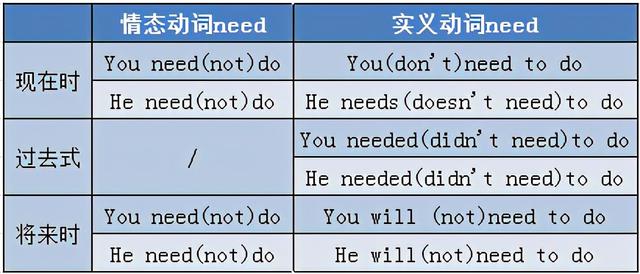
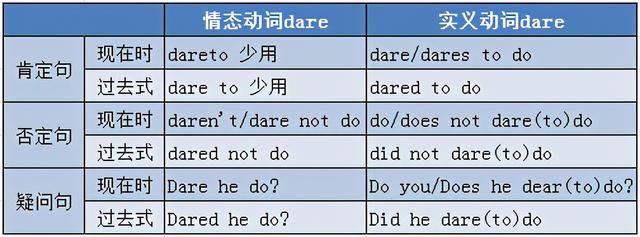
needn't have v-ed 表示过去做了某事,但没有做的必要,意为“本没必要……”。
如:You needn't have waken me up; I don't have to go to work today.
表推测的情态动词句子的反意疑问句
He must/may be in the room, isn't he?
He can't be in the room, is he?
He must have finished the work, hasn't he?
He may have done the work last night, didn't he?
情态动词 行为动词进行式
情态动词 行为动词进行式(即情态动词 be v-ing形式),表示推测或评论某动作现在是否正在进行。
如:He must be playing basketball in the room.
She may be staying at home.
情态动词 行为动词完成进行式
情态动词 行为动词完成进行式(即情态动词 have been v-ing 形式),表示推测或评论过去某动作是否正在进行或一直在进行。
如:They should have been meeting to discuss the problem.
He may / might have been buying stamps in the post office when you saw him.
used to v, be used to v-ing和be used to v
⒈ used to v意为“过去常常”,“过去一直”;
be used to v-ing/ n(名词)意为“习惯于”;
be used to v意为“被用来(做某事)”。
⒉ used to只表示过去,而be used to v-ing / n可表示现在、过去或将来。
如:He used to smoke. Now he doesn’t.
He’s quite used to hard work /working hard.
The knife is used to cut bread.
用作情态动词的其他短语
would rather,would sooner,would (just) as soon, had rather, hadbetter, had sooner, can not but, may (just) as well等可用作情态动词。
如:The soldier would sooner die than surrender.
The brave soldier would as soon dieas yield to such an enemy.
I'd rather walk than take a bus.
If you do't like to swim, you may just as well stay at home.
这些短语后一般直接跟动词原形。would (had) rather,would (had) sooner, would (just) as soon后可跟that 引导的从句,that 常省去,从句要用虚拟语气。对现在和将来的假设用过去时,对过去的假设用过去完成时。
如:I would rather you came on Sunday.
I would sooner you hadn’t asked me to speak yesterday.
动词的时态和语态
I.单项填空(有46题)
1.【2019·江苏】 22.The musician along with his band members ___________ ten performances in the last three months.
A. gives B. has given C. have given D. give
【答案】B
【解析】考查现在完成时与主谓一致。句意:在过去的三个月里,这名音乐家与他的乐队成员已经完成了十场演出。由“in the last three months”可知,这句话的时态为现在完成时,故排除AD选项。本句主语为the musician,为第三人称单数形式,句中的“along with his band members”是附加成分,故谓语动词要用第三人称单数形式。故选B。
II.语法填空(有30题)
1.(2019全国I卷)In recent years some Inuit people in Nunayut _____ (report) increases in bear sightings around human settlements, leading to a belief that populations are increasing.
【答案】have reported
【解析】考查时态。根据上下文语境,尤其是时间状语in recent years可知,主句用现在完成时态,故填have reported。
2.(2019全国II卷)Picking up her “Lifetime Achievement” award,proud Irene ______(declare) she had no plans to retire from her 36-year-old business.
【答案】declared
【解析】考查谓语动词。根据上下文可知,该句主语为Irene,此处为谓语成分,根据后文had 以及said 可知用一般过去时态,故填declared。
III.短文改错(有23题)
1.(2019全国III卷)Though it may appear simple, it required a lot of ideas and efforts.
【答案】required改为requires
【解析】本句考查动词的时态。短文的主体时态都是现代时。故把 required改为 requires。
完整版领取方式查看文末。
分享高考英语50个知识点要掌握
1
动词短语搭配
1. be fond of “喜爱,爱好” 接名词、代词或动词的-ing形式
[1] He’s fond of swimming. 他喜欢游泳。
[2] Are you fond of fresh vegetables. 你喜欢新鲜蔬菜吗?
[3] He is fond of his research work. 他喜爱他的研究工作。
2. hunt for = look for 寻找
hunt for a job 找工作
3. in order to/so as to
两个词组都可引导不定式作目的状语, in order to可放于句首, so as to则不能, 其否定形式为in order not to / so as not to.
[1] He went to Beijing in order to/so as to attend an important meeting.
[2] In order to be noticed, he shouted and waved to us.
为了让我们注意他, 他朝我们又是叫喊又是挥手。
4. care about
[1] 喜欢,对……有兴趣 = care for
She doesn’t care about money.她不喜欢钱。
[2] 关心 = care for
She thinks only of herself. She doesn’t care about other people. 她只考虑自己。不关心别人。
[3] 在乎,在意(接从句或不接任何成分)
These young people care nothing about what old people might say. 这些年轻人根本不在乎老人说的话。
5. such as 意为“诸如……”,“像……”,是用来列举人或事物的。
She teaches three subjects, such as physics and chemistry. 她教三门科目,像物理、化学。
6. drop a line 留下便条, 写封短信
7. make yourself at home 别客气;随便;无拘束
If you get to my house before I do, help yourself to a drink and make yourself at home.
如果你在我之前到我家,自己喝点饮料,随便一点。
8. stay up 不睡;熬夜
[1] I'll be late home, don't stay up for me.
我将回家很晚,不要等我了。
[2] He stayed up reading until 2:00 in the morning.
他熬夜看书直到凌晨两点。
9. come about 引起;发生;产生
[1] How did the accident come about?
这场事故是怎么发生的?
[2] They didn't know how the change had come about.
他们不知道这个变化是怎样产生的。
10. except for 除……之外
[1] except 与 except for 的用法常有区别。except 多用于引起同类事物中被排除的一项。如:
①He answered all the questions except the last one.
除去最后一个,他回答了所有问题。
②We go there everyday except Sunday.
除了星期天,我们天天去那里。
[2] except for 用于引述细节以修正句子的主要意思。如:
①Except for oneold lady, the bus was empty.
除去一个老太太,这辆公共汽车全空了。
②Your picture isgood except for the colours.
你的画儿很好,只是某些色彩有问题。
[3] 但在现代英语中,except for也用于表示except的意思。如上述第一个例子可以是:
He answered all the questions except for the last one.
[4] 另外,在介词短语之前只能用except,不能用except for。
We go to bed before ten, except in the summer.
除了夏季,我们通常十点之前上床睡觉。
11. end up with 以……告终;以……结束
The party ended up with an English song.聚会以一首英文歌结束。
12. more or less 几乎;差不多;大约;大概;大体上
[1] I've more or less succeeded, but they haven't.
我差不多成功了,而他们没有。
[2] Our living condition has more or less improved.
我们的生活水平或多或少提高了。
13. bring in 引进;引来;吸收
[1] We should bring in new technology.
我们应该引进新技术。
[2] He brings in 800 dollars a month.
他一个月挣八百美元。
14. get away(from) 逃离
[1] The thieves got away from the shop with all our money.
小偷带着我们所有的钱从商店逃跑了。
[2] I caught a really big fish but it got away.
我钓到了一条好大的鱼,可是它逃掉了。
15. watch out (for)注意;留心
[1] Watch out! There is a car coming.
小心!汽车来了。
[2] Watch out for the hole in the road.
留神路上的那个坑。
16. see sb. off 给某人送行
Tomorrow I will see my friend off at the railway station.
明天我到火车站给朋友送行。
17. on the other hand 另一方面; 用以引出相互矛盾的观点、意见等,常说 on the one hand …… on the other hand 一方面……另一方面。
I know this job of mine isn't well paid, but on the other hand I don't have to work long hours.
我知道这份工作报酬不高,但从另一方面来说,我也不必工作太长时间。
18. as well as 和,还
He is a talented musician as well as being a photographer.
她不但是摄影师还是个天才的音乐家。
19. take place 发生
take one’s place 入座、站好位置、取得地位
take sb’s place 或 take the place of 代替、取代
20. on fire 相当于burning, 意为“燃烧;着火;起火”,有静态的含意。catch fire有动态的含意。
set…on fire/set fire to…用来表示“使……着火”、“放火烧……”。
Look, the theatre is on fire! Let’s go and help.瞧,剧院着火了,咱们去帮忙救火吧。
21. on holiday 在度假,在休假中
When I was on holiday, I visited my uncle.
我在度假的时候去看望了叔叔。
22. travel agency旅行社
=travel bureau
23. take off
[1] 脱下(衣服等), 解(除)掉
He took off his wet shoes.他脱下了湿鞋子。
[2] (飞机)起飞
The plane took off on time. It was a smooth take-off.飞机准时起飞。起飞非常顺利。
[3] 匆匆离开
The six men got into the car and took off for the park.这六个人上了车,匆匆离开去公园。
24. go wrong v. 走错路, 误入岐途, (机器等)发生故障
25. in all adv. 总共
26. stay away v.外出
27. look up 查询(如宾语为代词,则代词放中间)
Look up the word in the dictionary. 在字典里查单词。
相关词组:look for 寻找;look after照顾,照料;look forward to期待;look into调查;look on旁观;look out注意;look out for注意,留心,提防;look over翻阅,查看,检查;look around环视;look through翻阅,查看。
28. run after 追逐,追求
If you run after two hares, you will catch neither.同时追两只兔子,你一只也抓不到。
29. on the air 广播
[1] We will be on the air in five minutes.我们五分钟以后开始广播。
[2] This programme comes on the air at the same time every day.这个节目每天在同一时间播出。
30. think highly/well/much of对……评价很高, 赞赏, 对……印象好;
think badly/nothing/little/lowly of……认为不好, 对……不在意, 不赞成, 觉得……不怎么样
[1] He was highly thought of by the manager.经理对他非常赞赏。
[2] I think well of your suggestion.我觉得你的建议很好。
[3] I don’t think much of him as a teacher.我觉得他作为一个老师不怎么样。
完整版领取方式如下:


1、点击头像进入主页然后再关注,2、接着点击“私信”发送【01】即可
,

